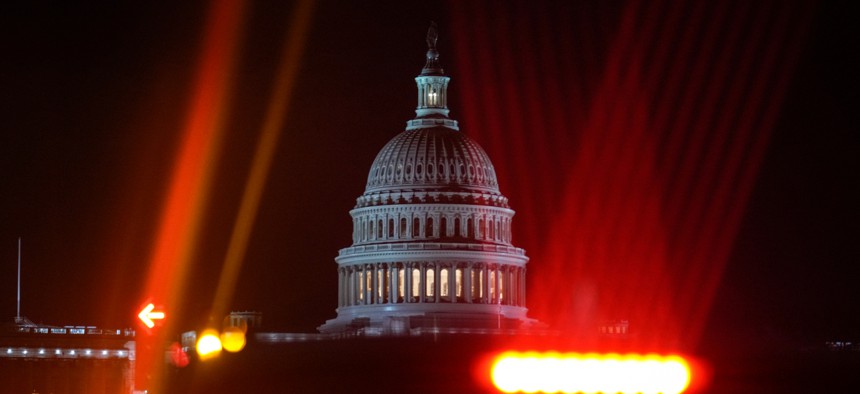
The measure similarly passed the House early in the 117th Congress, but it never received a vote in the Senate. Drew Angerer/Getty Images
The House Wants Agencies to Reveal the Deals They Cut to Avoid Lengthy Legal Battles
The settlement agreements federal agencies enter into would become more transparent under a bill passed Tuesday.
The House on Tuesday passed a bill to shine a light on all settlement agreements entered into by federal agencies, with lawmakers saying stakeholders and Americans writ large deserve to know the details of those deals.
The bipartisan Settlement Agreement Information Database (SAID) Act (H.R. 300) was approved in a unanimous vote. The measure would make public legally binding settlement agreements that agencies often enter into to avoid going through lengthy trials. Supporters of the bill said it would benefit state and local governments, industry stakeholders and taxpayers, all of whom are potentially impacted by the outcomes of the settlements.
Under the bill, agencies would have to submit information to the White House regarding any settlement or consent decree related to a violation of civil or criminal law. The Office of Management and Budget would set up and oversee a database that would include dates, payments, attorney fee awards and a list of all entities impacted by the settlement. An agency head could determine that confidentiality is necessary to "protect the public interest of the United States," but must issue a public statement to justify that decision.
Rep. Gary Palmer, R-Ala., who wrote the bill, said on the House floor Tuesday that agencies were increasingly turning to settlement agreements that denied the public the transparency that public trials provide.
“The SAID Act will shine a much-needed light on settlement agreements," Palmer said.
Federal agencies frequently enter into settlements with individual employees who appeal adverse personnel actions such as firings and suspensions to the Merit Systems Protection Board, with about half of non-dismissed cases before the agency typically resulting in such an agreement. Agencies can also enter into settlements with various entities as a result of enforcement actions.
A Republican aide, however, said the goal of the bill was to focus more on consent decrees that agencies often enter into with local jurisdictions. Local leaders sometimes do not know the full extent of those agreements—particularly if they were agreed to by predecessors—and the bill would create an avenue for them to retrieve the details.
"Federal settlement agreements, negotiated behind closed doors, cannot continue to be shrouded in secrecy when they directly affect States, municipalities, and local stakeholders," said Rep. Gerry Connolly, D-Va., a cosponsor of the bill said in a statement he submitted for the congressional record. "The SAID Act brings these binding agreements into the light by requiring federal agencies to publicly publish their documents or provide the public with written justification to keep the records confidential."
Rep. Jamie Raskin, D-Md., who serves as the top Democrat on House Oversight and Accountability Committee, said the bill would prevent "secret sweetheart settlements with certain litigants," adding, "It has to be open to the whole public."
The measure similarly passed the House early in the 117th Congress, but it never received a vote in the Senate. The aide said there is more optimism that this time around the upper chamber can “hotline” the bill and get quick approval of the bill without consuming much floor time. Some Republican senators have already expressed an interest in shepherding the bill to President Biden’s desk, the aide said.







